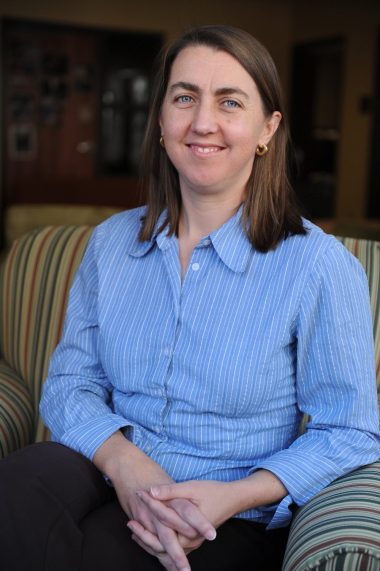Ann J. Cahill, a prolific scholar who has influenced the field of feminist philosophy and an accomplished professor who has guided hundreds of Elon students for more than a decade, has been named the 2011 Distinguished University Scholar.

Cahill is the 12th recipient of the award, which recognizes a faculty member whose research has earned peer commendation and respect, and who has made significant contributions to his or her field of study.
“Dr. Cahill is among the most celebrated contemporary thinkers in the area of postmodern feminist philosophy,” says a colleague in the Department of Philosophy. “There is no higher purpose in philosophy than fighting for the empowerment of historically repressed groups and Dr. Cahill is one of its most courageous practitioners.”
Since joining Elon’s faculty in 1998, she has written book chapters and numerous articles that have appeared in premier journals in the field of feminist philosophy, as well as two books on topics central to feminist thinking that had not been extensively explored. She has also co-edited two anthologies, presented at dozens of national and international conferences and received several fellowships and research grants, including five summer fellowships awarded by the Faculty Research and Development Committee at Elon.
Cahill’s work, which one colleague describes as “clear, thought provoking, original and compelling,” has become central to postmodern feminist philosophy and is frequently cited in that field’s literature and used as an instructional tool on college campuses across the country.
Her first book, Rethinking Rape (2001), drew from her dissertation at the State University of New York at Stony Brook, where she earned her doctorate in 1998. In it, Cahill sought to redefine the phenomenon of sexual violence by placing embodiment at its center: the mind does not have a body but rather is the body, therefore rape is a crime against the very self and not just a crime of property as it’s typically construed.
Her most recent book, Overcoming Objectification: A Carnal Ethics, published in December 2010, is a critique of the feminist notion of objectification. It explores an emerging theoretical approach to feminist thinking in which women aren’t considered objects but rather restrained from reaching their full potential by conforming themselves to how men define sexuality.
“The book is extremely well argued, researched and documented, and it promises to be an important addition to contemporary discourse in feminist philosophy in particular, and the nature of the person, in general,” says a colleague.
Her contributions to Elon include chairing the Department of Philosophy since 2008 and the Sexual Assault and Gender Issues Council since 2006. She was named a Center for the Advancement of Teaching and Learning Scholar for 2010-2012 for her project, “Argumentation Step-by-Step,” which further develops an innovative, learning-centered approach to teaching argumentation and transforms it into a web-based curriculum that can be shared with instructors at other institutions. This year she was also honored with the Elon College Excellence in Scholarship Award.
“Part of our appreciation for the accomplishments of colleagues like Cahill is an appreciation for how much else they do as part of their professional lives at Elon and beyond,” says a fellow Elon philosophy professor. “(Her) scholarship has moved her into the ranks of those whose sustained contributions to the profession merit recognition as truly ‘distinguished.’”
For Cahill, being an active scholar has not only served as a form of activism and been central to herself as a philosopher, but also given her the ability to share her enthusiasm for ongoing scholarly conversations with her students.
“In a word, my scholarship gives my teaching energy,” she says.


